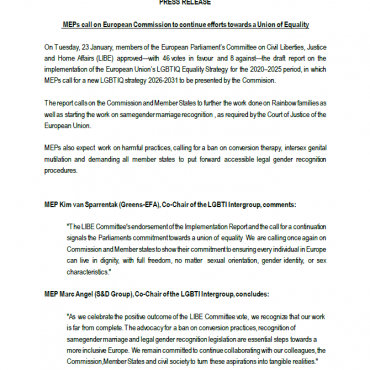Parliament demands inclusion LGBTI people in gender mainstreaming activities
In a key report voted yesterday on Gender mainstreaming in the work of the European Parliament, the European Parliament made a strong call to include “the rights, perspectives and well-being of LGBTIQ people” in all gender mainstreaming* activities.
 An attempt by a group of right-wing MEPs to replace the whole resolution by an alternative resolution was defeated.
An attempt by a group of right-wing MEPs to replace the whole resolution by an alternative resolution was defeated.
The report includes a call to the Commission to perform systematic gender impact assessments sensitive to the experiences of LGBTIQ persons on all new legislative or policy proposals (par. 18).
This means that the impact of different proposals will be specified for LGBTI persons, with a view to combat discrimination.
As for its own internal policies, the European Parliament suggests the introduction of specific human resources guidelines sensitive to LGBTIQ issues, to improve the well-being of staff at the work place (par. 26).
Angelika Mlinar MEP, author of the report and Member of the Intergroup on LGBTI Rights, reacted: “Women and LGBTI people fight the same fight to end violence and discrimination.”
“To this end, we need constructive action and need to see how the money that we spend impacts women and LGBTI people. We will strongly check on the Commission to ensure that they ensure that all gender mainstreaming activities will include LGBTI people.”
Sirpa Pietikainen MEP, Vice-President of the LGBTI Intergroup and shadow rapporteur on the report, added: “Research shows that there is a strong correlation between attitudes towards women and homo- and transphobia. Countries with liberal attitudes to gender roles are more likely to have a high level of acceptance of LGBTI people, and vice-versa.”
“I am very glad the Parliament recognised this today, and has included combatting discrimination of LGBTI people as a key part of its gender mainstreaming activities”
Read more:
* Gender mainstreaming means the integration of a gender perspective into the preparation, design, implementation, monitoring and evaluation of policies, regulatory measures and spending programmes, with a view to promoting gender equality and combating discrimination.






